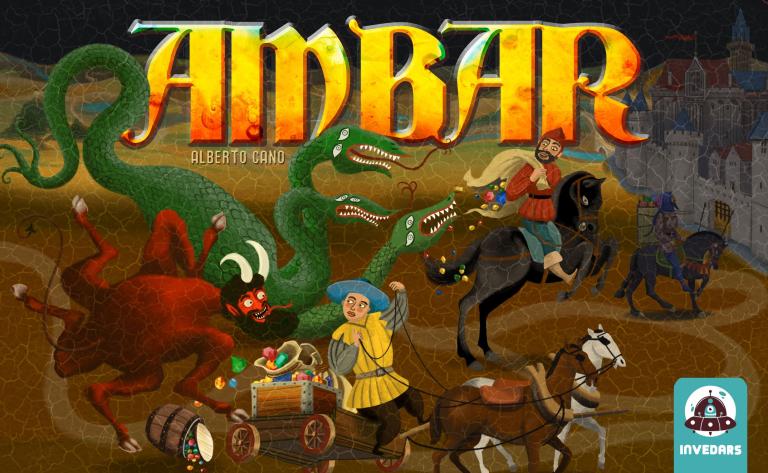Ambar

Ambar
Millions of years old, amber is considered a semi-precious jewel used since ancient times. While the best known color of amber is yellow/honey, there are rare varieties of other colors. In Ambar, you want to collect the amber by following dangerous routes to create attractive jewels and sell them to the highest bidder in villas and castles. There are two main play areas:
The route days, which we will form by picking up cards from the route deck during the turn.
The action zone, which is made up of four fixed cards in front of each player.
During their turn, a player picks up cards from the route deck, where neutral cards (cream color) and cards that represent dangers of the journey (black cards) will appear. Each card represents one day, and the more days you play (Phase 1 of the turn), the more actions you can take (Phase 2 of the turn). These actions are used to collect amber, produce precious jewels with it, and take them to villages where they can be sold.
The game is divided into two different rounds. The first round comes with fewer resources and involves less danger. The second round adds up the discard cards from the first round mixed with the new cards from the second round. When the cards of the second round are finished, the game ends, and the player with the most gold wins.
During the whole game, demons are chasing the players. In the first round there is the snake demon, which chases the player who advances too much (five or more days of travel) and in the second round is the red demon, which always chases the player with the most gold.
Quick turn overview: You take cards from the deck placing them on the board, and some events happen. When you hold, you take actions in your area, one for each card previously played on the board, producing your jewels. Then, you can sell to a trade card to get gold. Later, you can buy something with your gold, improving your resources. At the end of the turn, you will solve the demon cards, if there are any of them in this turn.
—description from the publisher
The route days, which we will form by picking up cards from the route deck during the turn.
The action zone, which is made up of four fixed cards in front of each player.
During their turn, a player picks up cards from the route deck, where neutral cards (cream color) and cards that represent dangers of the journey (black cards) will appear. Each card represents one day, and the more days you play (Phase 1 of the turn), the more actions you can take (Phase 2 of the turn). These actions are used to collect amber, produce precious jewels with it, and take them to villages where they can be sold.
The game is divided into two different rounds. The first round comes with fewer resources and involves less danger. The second round adds up the discard cards from the first round mixed with the new cards from the second round. When the cards of the second round are finished, the game ends, and the player with the most gold wins.
During the whole game, demons are chasing the players. In the first round there is the snake demon, which chases the player who advances too much (five or more days of travel) and in the second round is the red demon, which always chases the player with the most gold.
Quick turn overview: You take cards from the deck placing them on the board, and some events happen. When you hold, you take actions in your area, one for each card previously played on the board, producing your jewels. Then, you can sell to a trade card to get gold. Later, you can buy something with your gold, improving your resources. At the end of the turn, you will solve the demon cards, if there are any of them in this turn.
—description from the publisher
Player Count
2
-
4
Playing Time
35
-
45
Age
10
Year Released
2018
Newest Review
Remote video URL
